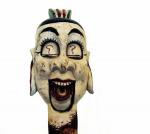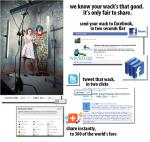What’s your story?
Share and find customer experiences
Connect with the people behind them
Wacktrap is
feedback made social
Trending Content
Airlines Baggage and 7.8 Billion in Fees Rake Passengers
by copythis
Airline carriers are raking in billions in fees to passengers: $7.8 billion in ancillary fee revenue last year, up 42% from a year earlier—2.7 billion in the first quarter of 2010, with Delta leading the charge. Tacked-on airline fees for air travelers are going anywhere but down--as Spirit Airlines starts a new $45 fee for each carry-on bag.
Airline industry revenue--for checked baggage alone—shot to $769 million compared to $578 million from the same point last year, says the Transportation Department.
U.S. Airlines' windfall revenue alone—just from passenger baggage fees--shot up 33% during the first three months of this year compared to the same time in 2009.
Airlines also made $554 million in fees to change flight or plane reservations and yet another $534 million from other "ancillary" services that include frequent-flier miles or the extra fee of flying a pet.
Airlines brought in $1.86 billion in the first quarter of 2010--which doesn't even include the airlines’ sale of on-flight services like food and drinks, pillows, blankets, on-flight entertainment or other fees charged for seat assignments. And while revenue from bag fees was up, the industry's overall ancillary revenue remained largely flat compared with the first quarter of last year.
Checked baggage fees last year comprised about one-third of the fee revenue—roughly $2.7 billion dollars for baggage alone.
Analysts claim that the upward fee revenue trend indicates that airline passengers are increasingly willing to pay some fees and that the airlines aren't about to abandon the fees — regardless of how unpopular they are with airport travelers.
"This has become a billion-dollar industry," says Anne Banas, executive editor of SmarterTravel. "This is clearly working for the airlines. And they're [airline baggage and ancillary fees] not going away anytime soon."
Banas says airline travelers and fliers demonstrate that they’re willing to pay for services they consider essential (or simply don’t have an option to avoid), such as checking bags—while avoiding paying extra for fees like reservation changes in order to get home earlier.
Delta Airlines took in the most fee revenue—the airline became the world's largest industry company following its merger with Northwest Airlines. Delta took in the most ancillary revenue in the first quarter of 2010—a cool $592 million in ancillary fees alone.
Airline passengers can, ironically, thank Spirit Airlines—which touts itself as the low-cost airline carrier—for leading the way in starting the huge round of baggage and ancillary fees that airport passengers now pay to fly. When Spirit started the fees a couple of years ago, the remainder of the airline industry took it as a go-ahead—and most have began charging those baggage and ancillary fees to customers.
In a move that could spark yet another round of tacked-on service charges, Spirit Airlines is now beginning to charge luggage taken on-board for carriage in overhead bins. Passengers that could at least try to save on some fees, by slimming down suitcase size or carrying their own baggage on board, will have no alternative—Spirit will begin charging $45 for each carry-on bag or $30 if the fee is paid online, in advance.
Spirit Airlines—through charging passengers extra for flight services that used to be included in the ticket price—received more than one-fifth of the airlines’ operating revenue from ancillary sources or tacked-on passenger fees: Spirit received the largest percentage of ancillary fee revenue of the entire airline industry.
The ancillary fees, which became commonplace after Spirit prompted the start of fees in the airline industry a couple of years ago, have now pulled in over 2 billion over 21 operating United States airlines.
Delta had the highest operating profit, $107 million, among traditional network airlines, the bureau reported.
Southwest, which doesn't charge to check up to two bags, actually pulled in the biggest operating profit among discount carriers—of $54 million.
To boost ancillary revenue, airlines are now throwing ‘perks’ into packages that passengers didn’t even pay for previously: combinations like free bag checks and moving forward in security lines or boarding the plane early—but all for yet another fee.
"They just keep finding more and more things to pay for and packaging it [additional airline fees charges] more creatively now," Banas says.
SPEED UP YOUR ONLINE GROWTH
How To Wack
Take the Tour
Click on any image to start











